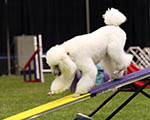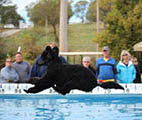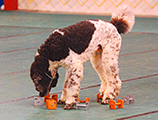Puppy Immunity and Vaccines
This information is provided by Versatility in Poodles (VIP) for informational purposes. It is assumed that you are caring for your puppy in concert with your veterinarian.
What You Need to Know:
Definitions:
Antigen–a substance (bacteria, virus, or protein) that stimulates the immune system to produce a protein molecule which attaches to the antigen and inactivates it.
Antibody–the protein molecule made by the immune system to react with an antigen to make it inactive.
- Puppies are born with a very immature immune system and don’t begin making their own antibodies until about 6 weeks of age.
- The first milk produced by the dam is very high in antibodies. This first milk is called colostrum.
- During the first 24 hours of life, the puppy GI tract is able to absorb antibodies into their system from the colostrum which they ingest from their mother.
- After the first 48 hours following birth have passed, the puppy’s GI tract is no longer able to absorb the whole proteins (antibodies) ingested. Instead, the proteins are broken down by enzymes, absorbed as small pieces, and metabolized to make new proteins for growth and development in the puppy.
- Excessive vaccinations can result in a disease complex called vaccinosis, a long-term immune problem shown by a multitude of symptoms. (We suggest a Google search on this topic.)
- The first vaccination usually neutralizes any residual maternal antibodies in the puppy. It may not adequately stimulate development of intrinsic antibodies because it is used up by attaching to the residual antibodies if it is given too early.
- If a puppy has early vaccination or gets no or minimal colostrum, it will be easily infected by bacteria and virus that it encounters until more than 2 weeks after the first effective vaccination because it has no immunity.
- Modified live type vaccination is more effective at producing immunity, but it also results in the rare possibility of producing disease as the live virus may multiply in the puppy.
- The currently available leptospirosis vaccine is not effective against most of the leptospirosis varieties found in nature. It also makes most puppies feel bad with a fever and lethargy for a day or more after immunization. Immunity produced by leptospirosis vaccination usually only lasts about 4 months. The new leptospirosis vaccine is effective for more varieties, but may still miss some of the ones in some regions. Discuss its value for your situation with your veterinarian.
- Multivalent vaccine may depress the immune function of a puppy for about 2 weeks following administration.
Principles to Keep in Mind:
- Begin puppy immunizations no earlier than 7 weeks.
- Allow at least 4 weeks between initial immunization and the second (booster) shot.
- A third immunization may be given at about 6 months of age, separated by a month from the rabies immunization.
- After the 6-month shot, determine further need for immunizations based upon antibody titers. Many find that it is not necessary to administer the 4th booster until age of 6 or 7 years or later. (Remember that each state has a different law regulating the requirements for rabies vaccines and when they must be administered.)
- Excessive immunization can contribute to multiple immune-mediated diseases in animals.
Methods and Vaccines:
- Dr. Jean Dodd (a hematologist) has an elaborate vaccination schedule which she continuously modifies as new information becomes available. Her 2009 recommendations are at https://drjeandoddspethealthresource.tumblr.com/post/147595920886/dodds-vaccination-protocol-dogs-2016#.WpjEyugbNPY.
- The American Animal Hospital Association has a very detailed monograph on canine vaccine recommendations at https://www.aaha.org/guidelines/canine_vaccination_guidelines.aspx.
- Veterinary News has a less detailed list of recommendations which can be found at http://veterinarynews.dvm360.com/dvm/article/articleDetail.jsp?id=46546.
They recommend AGAINST using corona, giardia and adenovirus-1 vaccines. - An overview of the recommendations:
- At 8 weeks give DHPP.
- At 12 weeks give DHLPP.
- At 16 weeks give DHLPP.
- At 20 weeks (or age required in your state) give rabies.
- At one year check antibody titers.
- At 3 years give rabies (or as required by law in your state) and repeat antibody titers.
- At 6 years give rabies (or as required by law in your state) and repeat antibody titers.
Vaccination protocols continue to change so please monitor the above websites for the latest recommendations. The material presented in this document is current at the time of publication but may change rapidly.
The information contained in these documents is current at the time of this writing and is accurate to the best of VIP’s knowledge.
This information has been provided to you at no charge. You are free to use it provided it is used in its entirety with no changes or alterations and that the copyright remains intact. If you have found this information to be helpful, please consider making a tax-deductible donation to:
Versatility in Poodles
4061 Highlands Rd
Franklin, NC 28734
To make a donation via PayPal, please click the Donate Button:
The contents of the www.vipoodle.org website, such as text, graphics, images, and other material contained on this site (“Content”) are for informational purposes only. The Content is not intended to be a substitute for professional veterinarian advice, diagnosis, or treatment. Always seek the advice of your veterinarian with any questions you may have regarding the medical condition of your pet. Never disregard professional advice or delay in seeking it because of something you have read on this website!
If you think your pet has a medical emergency, call or visit your veterinarian or your local veterinary emergency hospital immediately. Versatility in Poodles and www.vipoodle.org do not recommend or endorse any specific veterinarians, products, procedures, opinions, or other information that may be mentioned on this website. Reliance on any information appearing on this website is entirely at your own risk.















